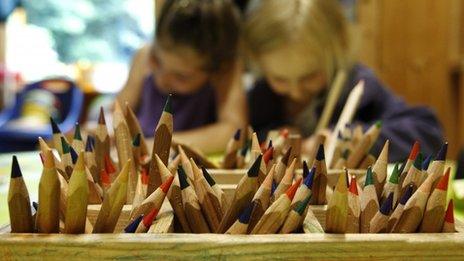Pupils have Sats test panic attacks, says NUT study
- Published

There are warnings from teachers that primary school tests are causing stress among pupils
Primary pupils in England are self-harming and having panic attacks because of anxiety over national tests, research suggests.
The study for the National Union of Teachers says some pupils pushed into working beyond their ability are becoming stressed and disaffected.
It comes as the NUT is to vote on boycotting tests for reception pupils.
These tests are intended to be a baseline to make sure pupils are making enough progress through primary school.
The research, by Prof Merryn Hutchings of London Metropolitan University and released at the NUT conference in Harrogate, is based on a survey of 8,000 teachers and in-depth interviews with staff and pupils at seven schools.
Nine out of 10 teachers said many pupils became "very anxious/stressed in the time leading up to Sats/public examinations".
And three-quarters (76%) of primary teachers and 94% of secondary teachers said pupils had "developed stress-related conditions around the time of Sats/public examinations".
In the interviews, one teacher said: "Many girls self-harm, have panic attacks and emotional problems because they cannot be perfect".
Another said: "Last year I had a Year 6 pupil turn to physical self-harming which she attributed to the pressure she felt to achieve a level similar to that of her peers, and to hit a level four in Sats (she is severely dyslexic and an incredibly hard worker)."
Researchers also heard concerns about how some pupils talked about their achievements with each other.
'I'm a 5b'
The study said: "Primary pupils said that classmates sometimes boasted about the levels that they had reached (I'm a 5b) or jeered at those who were less successful."
An emphasis on targets had led to fewer opportunities for pupils to take part in creative, investigative and practical activities, says the research.
The study found that in primary schools, many teachers report that the amount of time spent on the core subjects of English and maths increases in Year 6 in order to prepare for the Sats tests taken by 11 year olds, with other areas taught less, or not at all.
NUT general secretary Christine Blower said her union has "long argued that league tables, high-stakes testing and other accountability measures have a negative effect on children and young people".
"What gets lost for those who matter most - the pupils - is the rounded education that we all wish to see and the emotional and pastoral support that children and young people also need from their teachers."
Ministers have introduced overhauls of the primary curriculum and Sats tests, saying the reforms are needed to ensure that youngsters get a good grounding in the basics.
'Baseline tests'
NUT conference delegates are to debate taking action against "baseline" assessments when pupils start school.
Under the outgoing government's reforms, from September, infants will undergo literacy and numeracy checks just weeks after they start reception. The results will be used as a starting point to chart children's progress throughout primary school.
Ministers have insisted that the move will help ensure children leave primary school with a good standard of reading, writing and maths.
But the NUT's resolution argues that the primary curriculum is over-crowded and restrictive and that a focus on "high-stakes testing" is having a negative impact on children's education.
- Published21 April 2014

- Published19 March 2015
